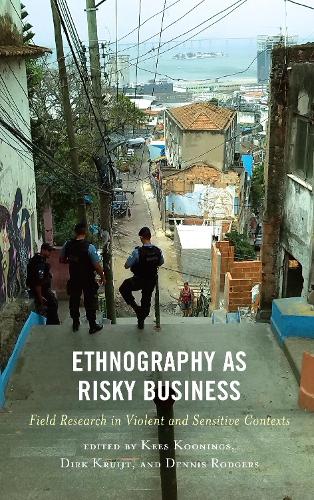
Ethnography as Risky Business: Field Research in Violent and Sensitive Contexts
(Paperback)
Available Formats
Publishing Details
Ethnography as Risky Business: Field Research in Violent and Sensitive Contexts
By (Author) Chris van der Borgh
Contributions by Ingeborg Denissen
Contributions by Tessa Diphoorn
Contributions by Marie Louise Glebbeek
Contributions by Elisabet Dueholm Rasch
Contributions by Kees Koonings
Edited by Kees Koonings
Contributions by Dirk Kruijt
Edited by Dirk Kruijt
Contributions by Simone Remijnse
Bloomsbury Publishing PLC
Lexington Books
9th November 2020
United States
Classifications
Professional and Scholarly
Non Fiction
305.8
Physical Properties
Paperback
254
Width 153mm, Height 220mm, Spine 18mm
376g
Description
Ethnography as Risky Business: Field Research in Violent and Sensitive Contexts offers a hands-on, critical appraisal of how to approach ethnographic fieldwork on socio-political conflict and collective violence, focusing on the global south. The volumes contributions are all based on extensive firsthand qualitative social science research conducted in sensitive--and often hazardous--field settings. The contributors reflect on real-life methodological problems as well as the ethical and personal challenges such as the protection of participants, research data and the ethnographic self. In particular, the authors highlight how risky ethnography requires careful maneuvering before, during, and after fieldwork on the basis of a situated ethics, yet also point to the rewards of such an endeavor. If these methodological, ethical and personal risks are managed adequately, the yields in terms of generating a deep understanding of, and critical engagement with, conflict and violence may be substantial.
Reviews
A must-read for undergraduate and graduate students of conflict and violence! It is theoretically interesting, reflecting a deep, long-term engagement around the University of Utrecht on issues of conflict, social exclusion and marginalization. It is methodologically important, developing an ethical ethnography so much more interesting than the stale rehearsals of ethics boards. Each contributor brings something important to the table, while at the same time maintaining a conversation across each chapter. No small feat at all! -- Steffen Jensen, Aalborg University
This timely volume is a critical resource on contemporary fieldwork in violent social contexts. Its a must-read for anthropologists and other scholars engaged in risky qualitative research, where ethnographic encounters involve distrust, suspicion, paranoia and hostility. The brilliant, provocative contributions take the readers on a reflexive journey into the ethically ambiguous world of conducting research in unstable regions. -- Atreyee Sen, University of Copenhagen
Foregrounding both the pitfalls and the potential of ethnographic research in violent or politically fraught contexts, the essays in this volume draw from a broad range of fieldwork experiences to highlight the various emotional, ethical, and political dilemmas researchers may encounter. Offering honest, thoughtful reflections on how to negotiate the complexity of such risky research, this collection will be highly useful to those considering embarking on this type of fieldwork, as well as those returning from it. -- Rivke Jaffe, University of Amsterdam
Author Bio
Kees Koonings is associate professor of anthropology and development studies in the Department of Cultural Anthropology at Utrecht University and professor of Brazilian studies at CEDLA, University of Amsterdam.
Dirk Kruijt is professor emeritus of development studies in the Department of Cultural Anthropology at Utrecht University, research fellow at the Center for International Studies of the University Institute of Lisbon, and research fellow at the Centre for Military Studies, Stellenbosch University.
Dennis Rodgers is research professor in the Department of Anthropology and Sociology at the Graduate Institute of International and Development Studies and visiting professor in international development studies at the University of Amsterdam.
